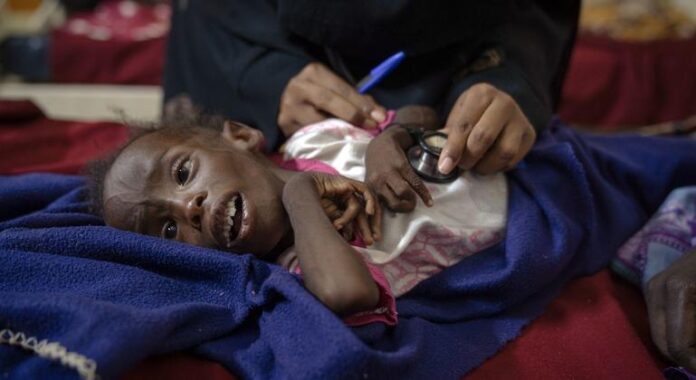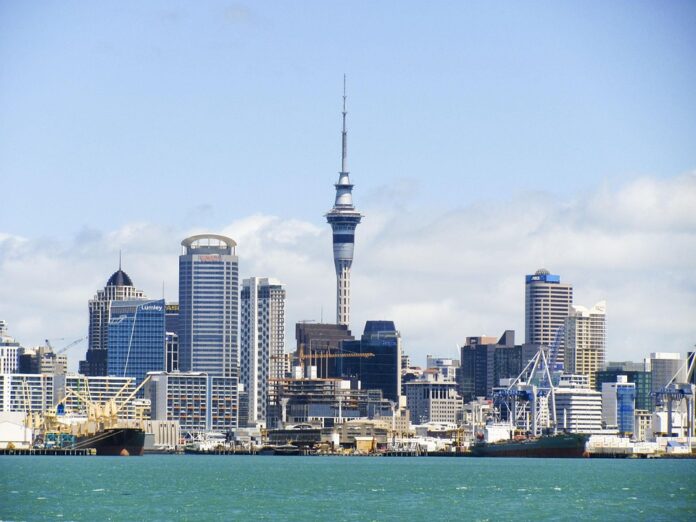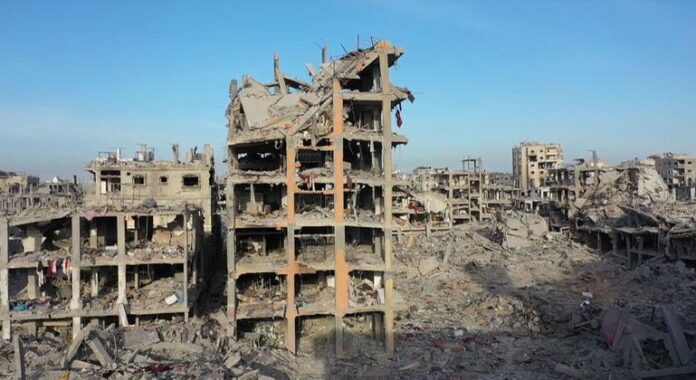Microsoft unveiled fresh capabilities for its Edge browser on Thursday, digging itself deeper into territory OpenAI had claimed
Microsoft Copies OpenAI’s Browser Design Just 48 Hours Later
Joint Statement of the Organisation of African, Caribbean and Pacific States and the European Union and its Member States on the occasion of the United Nations Day
Joint Statement of the Organisation of African, Caribbean and Pacific States and the European Union and its Member States on the occasion of the United Nations Day.
Millions pushed to ‘brink of survival’ in Sudan
Sudan stands at the epicentre of one of the world’s “most severe” humanitarian crises, according to the UN.
Over 30 million people now need urgent humanitarian assistance, among them 9.6 million displaced from their homes and nearly 15 million children caught in a struggle for daily survival.
“This is one of the worst protection crises we’ve seen in decades,” said Kelly Clements, Deputy High Commissioner at the UN refugee agency (UNHCR).
The agency, along with the International Organization for Migration (IOM), the UN Children’s Fund (UNICEF), and the World Food Programme (WFP) have issued a joint humanitarian call to action, appealing for immediate international attention to address “the immense suffering and growing dangers” confronting millions across Sudan.
Return to rubble
As fighting eases in the capital Khartoum and other parts of Sudan, nearly 2.6 million people are returning to damaged homes, many without access to water, healthcare, or education.
“I met people coming back to a city still scarred by conflict, where homes are damaged and basic services are barely functioning. Their determination to rebuild is remarkable, but life remains incredibly fragile”, said Ugochi Daniels, IOM’s Deputy Director General for Operations.
To make matters worse, the spread of diseases such as cholera, dengue, and malaria, combined with soaring malnutrition rates, is putting thousands at imminent risk of death without immediate assistance, according to IOM.
Over 260,000 civilians besieged
Meanwhile, over 260,000 civilians, including 130,000 children, remain trapped under siege in El Fasher, North Darfur, in what the UN agencies have called a “deeply concerning” situation.
For more than 16 months, families have been cut off from food, water, and healthcare. As health systems collapse, reports of killings, sexual violence, and forced recruitment into armed militias continue to rise.
“Entire communities are surviving in conditions that defy dignity”, warned Ted Chaiban, UNICEF Deputy Executive Director.
“Children are malnourished, exposed to violence, and at risk of dying from preventable diseases. Families are doing everything they can to survive, showing extraordinary resolve in the face of unimaginable hardship,” he added.
Young men celebrate the liberation of a neighbourhood in Khartoum in April 2025. (file)
Challenges ahead
So far, the humanitarian response in Sudan has reached over 13.5 million this year.
Despite this, funding shortfalls are making it increasingly difficult for the UN and its partners to deliver the appropriate aid.
Totalling US$4.2 billion, the 2025 Humanitarian Response Plan for Sudan remains critically underfunded at only 25 per cent.
IOM, UNHCR, UNICEF, and WFP remain committed to working together to provide life-saving aid and protection to children and families across Sudan.
“The humanitarian community is ready to respond, but it cannot do it alone —urgent global support is needed to save lives and help communities rebuild”, underscored the humanitarian agencies.
Remarks by President António Costa at the press conference following the European Council meeting of 23 October 2025
During the press conference held at the end of the European Council meeting of 23 October 2025, President António Costa presented the main results of the discussions.
Around forty migrants, including children, die in a shipwreck in Tunisia
The tragedy comes amid fears that deteriorating living conditions for refugees and asylum seekers in North Africa could push more families to undertake perilous journeys.
The boat, which left the Tunisian village of Salakta, capsized shortly after departure, killing nine women, 19 men and 12 children under the age of five, according to the UN International Organization for Migration.IOM).
The alert of a nearby fishing boat led to the rescue of 30 people. Among the survivors were men, women and children from Cameroon, Ivory Coast and Guinea.
“This is one of the deadliest maritime incidents recorded along the North African coast this year,” IOM said in a statement.
“This highlights the urgent need for coordinated action to prevent further loss of life. along the Central Mediterranean route,” the agency added.
Rising death toll
According to the IOM Missing Migrants Project, nearly 1,000 deaths and disappearances have already been recorded this year along the main road.
Since 2014, more than 25,000 people died attempting to cross from North Africa to Europemaking it the deadliest migratory crossing in the world. The latest incident brings the total number missing in the wider Mediterranean region, at more than 32,800.
Children were among the worst affected. At least 30 people have lost their lives off the coast of Tunisia this year alone, compared to 22 for all of 2024, the IOM said.
Forced by conflicts, crises
Tunisia has become an increasingly common departure point for people seeking to reach Italy, amid tighter controls and growing insecurity in neighboring Libya.
According to the United Nations High Commissioner for Refugees (UNHCR), Tunisia hosts more than 10,600 registered refugees and asylum seekers – Of which 86 percent come from countries affected by war or widespread violence.
Many are survivors of torture or gender-based violence or are unaccompanied children. Access to essential services has become increasingly limited, increasing protection risks and prompting some to attempt sea travel.
Guarantee safe and regular routes
IOM reiterated its support for “protection-sensitive search and rescue operations” and called for the expansion of “safe and regular migration pathways”. He said countries along major migration routes must strengthen coordination and ensure humanitarian principles guide their responses.
Since 2018, interceptions by the Tunisian and Libyan coast guards account for almost half of all recorded search and rescue operations. in the central Mediterranean.
This change can be attributed to several factors, including the reduction of Italian authorities’ maritime patrol zone and the shift of EU border management assets from maritime vessels to drones incapable of carrying out rescues at sea, IOM warned.
Originally published at Almouwatin.com
World news in brief: ICJ on Gaza, “a rare and positive day” for nuclear security in Ukraine and internally displaced people in Nigeria
The UN World Court concluded that Israel must also protect humanitarian and medical personnel, prohibit starvation as a method of warfare and cooperate with the United Nations, among other obligations.
In Remarks released by the UN spokesperson, Mr. Guterres urged Israel to respect its obligations to the UN and other activities of its humanitarian partners and stressed that all parties to the conflict must respect international humanitarian law and human rights.
Mr. Guterres reiterated his call to establish a political path to end the occupation towards a two-state solution “with Israel and Palestine living side by side in peace and security” within borders based on pre-1967 lines.
“Clear” obligations
THE UN human rights chief Volker Türk stated that ICJ The decision made Israel’s legal duties “crystal clear”, starting with ensuring that residents of Gaza and the wider Occupied Palestinian Territory receive essential supplies.
He urged Israel and all States to promptly comply with the Court’s findings and take concrete steps to address the grave humanitarian and human rights crisis.
All parties to the conflict, he added, must prioritize saving lives and providing aid, as these measures constitute the foundation for peacebuilding and a lasting ceasefire based on human rights and international law.
UN nuclear agency: Ukrainian power plant reconnected to the grid
Europe’s largest nuclear power plant in Zaporizhzhia (ZNPP) was successfully reconnected to Ukraine’s power grid on Thursday, the International Atomic Energy Agency announced (IAEA) reported.
This comes just two weeks after the IAEA ease a process of restoring external electricity to the plant, which had lost connection to the grid for the 10th time since the outbreak of the conflict in 2022.
“A beautiful and rare day”
“Today is a rare and auspicious day for nuclear safety and security in Ukraine and beyond, although of course the overall situation remains very precarious,” said IAEA Director General Rafael Mariano Grossi.
He added that despite the war, both sides agreed that it was “vital to restore off-site electricity and have cooperated constructively with us to achieve this.”
The agency is monitoring the restoration and coordinating with both parties to repair further damage.
Nigeria takes measures for internally displaced people
Nigeria has risen to the challenge and taken steps to deliver on the commitments of the UN Secretary-General. Action Program on Internal Displacement global.
This week, the heads of various United Nations agencies felicity praised the Nigerian government for its leadership in tackling internal displacement and called for increased international engagement to ensure a long-term solution.
Officials of the International Organization for Migration (IOM), United Nations refugee agency (UNHCR) and the United Nations Development Program (UNDP) concluded a three-day joint mission to the country, during which they met with politicians, traditional leaders and representatives of displaced people in various regions.
The team called on international financial institutions and development partners to increase their support for self-reliance and economic recovery.
“Nigeria’s experience shows that a clear shift is occurring, from humanitarian assistance to self-reliance, from short-term response to long-term recovery,” said UNHCR Assistant High Commissioner Raouf Mazou.
A unique commitment
“What makes Nigeria unique is its commitment to combining public investment with private sector engagement. »
Officials noted that the country has benefited from UN resources, which provide assistance with data, policies and coordination structures at the state level.
Shoko Noda, director of UNDP’s crisis office, added that “Nigeria has the potential to build a global model of solutions support, one that can inspire similar progress in other displacement contexts.”
Originally published at Almouwatin.com
Ceasefire provides ‘lifeline’ but Gaza hospitals remain in ruins
Tedros Adhanom Ghebreyesus welcomed the cessation of hostilities but declared that “the crisis is far from over and the needs are immense”.
He highlighted the toll of months of conflict: more than 170,000 people injured, including 5,000 amputees and 3,600 people seriously burned. At least 42,000 require long-term rehabilitation and 4,000 women give birth “in unsafe conditions” every month.
Psychological injuries
“The destruction was physical but also psychological,” he said. “An estimated one million people need access to mental health care. »
Tedros described a system on the brink of collapse. “There are no fully functioning hospitals in Gaza, and only 14 out of 36 are functioninghe said, citing “critical shortages of essential medicines, equipment and health workers.”
Since the ceasefire came into effect two weeks ago, WHO teams stepped up their support, sending medical supplies to hospitals, deploying emergency medical teams and facilitating evacuations.
“Yesterday, we supported the evacuation of 41 patients and 145 accompanying people to several countries“said Tedros, thanking more than 20 countries that took in evacuees.
700 dead awaiting evacuation
But with 15,000 patients still in need of care outside Gaza – including 4,000 children – he stressed that “more than 700 people have died while awaiting evacuation.”
He urged the reopening of the Rafah crossing and the reestablishment of medical referrals to the occupied West Bank, including East Jerusalem, to enable emergency care and expand aid delivery.
“Even though the flow of aid has increased, it is still only a fraction of what is needed,” Tedros said, pointing out that “a significant amount of aid has accumulated in Al-Arish in Egypt” pending the reopening of Rafah, at the southern tip of the enclave.
THE UN 60-day ceasefire plan calls for $45 million to maintain essential health servicesstrengthen disease prevention and early warning systems, coordinate health partners and support reconstruction.
However, rebuilding Gaza’s health system will cost “at least $7 billion”, he said. “WHO was in Gaza before the war began, we remained there throughout and we will remain there to help the people of Gaza build a healthier, safer and fairer future. »
Help and access
In New York, U.N. deputy spokesperson Farhan Haq said the U.N. and its partners were stepping up relief efforts. A UN team recently reached the Az Zaitoun neighborhood of Gaza City – inaccessible before the ceasefire – where more than 200 returning families are living in “extremely poor” conditions.
Residents walk up to two kilometers to reach the nearest water point and are in urgent need of food, clean water, hygiene items and financial assistance for winter essentials.
Meanwhile, UN agencies continue to provide lifesaving assistance. The World Food Program (PAM) is distributing fortified snacks to schoolchildren, while more than 140 trucks carrying food, hygiene kits and emergency shelter items entered Gaza earlier this week.
Children’s agency UNICEF delivered 20 truckloads of baby diapers and a crisis operations center UNOPS distributed nearly 160,000 liters of fuel for humanitarian operations.
“The ceasefire offers a lifeline,” Tedros said, “but Gaza’s health system – and its people – are still fighting for survival. »
Originally published at Almouwatin.com
Millions on the brink of survival in Sudan
Sudan is at the epicenter of one of the world’s “most serious” humanitarian crises, according to the UN.
More than 30 million people are now in need of emergency humanitarian assistance, including 9.6 million displaced people and nearly 15 million children caught in a daily struggle for survival.
“It is one of the worst protection crises we have seen in decades“, said Kelly Clements, Deputy High Commissioner of the United Nations refugee agency (UNHCR).
The agency, in collaboration with the International Organization for Migration (IOM), the United Nations Children’s Fund (UNICEF) and the World Food Program (PAM) issued a joint humanitarian call to actioncalling for immediate international attention to address the “immense suffering and growing dangers” facing millions of people across Sudan.
Back to the rubble
As fighting improves in the capital Khartoum and other parts of Sudan, nearly 2.6 million people return to their damaged homesmany do not have access to water, health care or education.
“I met people returning to a town still scarred by conflict, where homes are damaged and basic services barely function. Their determination to rebuild is remarkable, but life remains incredibly fragile,” said Ugochi Daniels, IOM Deputy Director General of Operations.
Worse still, the spread of diseases such as cholera, dengue and malaria, combined with soaring malnutrition rates, puts thousands of people at imminent risk of death without immediate assistance, according to the IOM.
More than 260,000 civilians under siege
Meanwhile, more than 260,000 civilians, including 130,000 children, remain under siege in El Fasher, North Darfur, in what UN agencies have described as “deeply worrying”.
For more than 16 months, families have been deprived of food, water and health care. As health systems collapse, reports of killings, sexual violence and forced recruitment into armed militias continue to rise.
“Entire communities survive in conditions that defy dignity“, warned Ted Chaiban, deputy executive director of UNICEF.
“Children are malnourished, exposed to violence and at risk of death from preventable diseases. Families are doing everything they can to survive, showing extraordinary determination in the face of unimaginable challenges,” he added.
Young men celebrate the liberation of a neighborhood in Khartoum in April 2025. (archive)
The challenges ahead
The humanitarian response in Sudan has reached more than 13.5 million people so far this year.
Despite this, the funding gap makes it increasingly difficult for the UN and its partners to provide appropriate assistance.
Totaling $4.2 billion, the Sudan Humanitarian Response Plan 2025 remains seriously underfunded, at just 25 percent.
IOM, UNHCR, UNICEF and WFP remain committed to working together to provide life-saving assistance and protection to children and families across Sudan.
“The humanitarian community is ready to respond, but it cannot do it alone: urgent global support is needed to save lives and help communities rebuild,” humanitarian agencies stressed.
Originally published at Almouwatin.com
Ceasefire offers ‘lifeline’ but Gaza hospitals remain in ruins
Tedros Adhanom Ghebreyesus welcomed the halt in hostilities but said “the crisis is far from over and the needs are immense.”
He highlighted the toll of months of conflict: more than 170,000 people injured –including 5,000 amputees and 3,600 people with severe burns. At least 42,000 require long-term rehabilitation, and 4,000 women give birth each month “in unsafe conditions.”
Psychological wounds
“The destruction has been physical but also psychological,” he said. “An estimated one million people need access to mental health care.”
Tedros described a system on the brink of collapse. “There are no fully functioning hospitals in Gaza, and only 14 out of 36 are functioning at all,” he said, citing “critical shortages of essential medicines, equipment and health workers.”
Since the ceasefire took effect two weeks ago, WHO teams have scaled up support, sending medical supplies to hospitals, deploying emergency medical teams, and facilitating evacuations.
“Yesterday, we supported the evacuation of 41 patients and 145 companions to several countries,” Tedros said, thanking over 20 nations that have received evacuees.
700 dead waiting for evacuation
But with 15,000 patients still in need of treatment outside Gaza – including 4,000 children – he stressed that “more than 700 have died while waiting for evacuation.”
He urged the reopening of the Rafah crossing and the restoration of medical referrals to the occupied West Bank, including East Jerusalem, to enable urgent care and expand aid delivery.
“Although the flow of aid has increased, it’s still only a fraction of what is needed,” Tedros said, noting that “a significant amount of aid has built up at Al-Arish in Egypt” awaiting the reopening of Rafah at the southern tip of the enclave.
The UN’s 60-day ceasefire plan seeks $45 million to maintain essential health services, strengthen disease prevention and early warning systems, coordinate health partners and support reconstruction.
Rebuilding Gaza’s health system, however, will cost “at least $7 billion,” he said. “WHO was in Gaza before the war started, we have been there throughout, and we will stay there to help the people of Gaza build a healthier, safer and fairer future.”
Aid and access
In New York, UN Deputy Spokesperson Farhan Haq said the UN and partners are stepping up relief efforts. A UN team recently reached Gaza City’s Az Zaitoun neighbourhood – inaccessible before the ceasefire – where more than 200 returning families live in “extremely poor” conditions.
Residents walk up to two kilometres to reach the nearest water point and urgently need food, clean water, hygiene items and cash assistance for winter essentials.
Meanwhile, UN agencies continue to deliver vital aid. The World Food Programme (WFP) is distributing fortified snacks to schoolchildren, while more than 140 trucks of food, hygiene kits and emergency shelter items entered Gaza earlier this week.
Children’s agency UNICEF has delivered 20 trucks of baby diapers, and crisis operations hub UNOPS distributed nearly 160,000 litres of fuel for humanitarian operations.
“The ceasefire offers a lifeline,” said Tedros, “but Gaza’s health system – and its people – are still fighting for survival.”
Security Council LIVE: Gaza ceasefire, aid crisis dominate agenda as ambassadors meet on Middle East
THE UN Security Council meets in New York to discuss the Middle East. The session comes amid halting progress in Gaza’s fragile ceasefire and growing humanitarian needs after two years of war, with famine still looming in parts of the territory. The ambassadors will likely discuss the ICJ’s advisory opinion issued yesterday, affirming Israel’s obligation to allow aid agencies access under international law. Follow our in-depth live coverage from 10 a.m.; UN News app users can go here.
Originally published at Almouwatin.com









